 |
 |
 |
| |
Black and Hispanic women in the United States are disproportionally affected by the HIV infection
|
| |
| |
International Workshop on HIV and Aging, September 23-24, 2021
This study reveals that BHWH aged 50 and above are a vulnerable population greatly affected by health disparities and psychosocial issues related to living with HIV infection. Higher levels of avoidant coping, depressive symptoms, and negative self-perception of health, as well as decreased social support, were significant predictors of psychosocial illness impact among our sample. Findings from this study have important implications for health policymakers and clinicians because they support the need to improve the psychosocial wellness of women living with HIV infection, specifically for BHWH aged 50 and above. Further research should consider developing culturally sensitive interventions with a comprehensive and interdisciplinary approach to promote community-based interventions and group support. (from Jules: these are not new findings. When will we implement adequate services to change these problems & provide the care & support needed for Black & Hispanic women, and for all women. In fact, when will HHS & HRSA proved the care & services all aging & elderly PWH need & require to live in dignity, after all the aging PWH population is the majority now with 50% over of the entire HIV population in the USA & its predicted that in 8 years 75% will be over 50. In NYC & SF 35% are already over 60. 90% in NYC with HIV & who receive care through Ryan White are African-American & Latino, these communities and the aging & elderly in NYC & NYS do not receive the care & services they need. At the Aging Workshop 2 studies from NYC Dept of Health & a survey from NYS reflects this.
view presentation-
https://www.youtube.com/watch?v=aQmAgmAEWjo
Abstract
Background: Blacks and Hispanics in the United States are disproportionally affected by the HIV infection. In 2018, one in six new HIV diagnoses in the US were among adults aged 50 and above 24% were women, and 60% were groups including Black/African American and Hispanics (42% and 18%, respectively). The rate of the HIV infection diagnosis among Black women was 17.3 times higher than the rate for non-Hispanic white women, and for Hispanic women, it was 2.5 times higher than non-Hispanic white women.
Purpose: The purpose of this study was to examine the factors related to HIV psychosocial impact among minority Black/African American and Hispanic women living with HIV (BHWH) aged 50 and above.
Materials & Methods: Guided by the Socio-Ecological Model, a cross-sectional design that included 138 minority BHWH 50 years and above was used for this study. Descriptive statistics and a multiple regression model were used to analyze the data.
Results:
The mean age for BHWH was 56.64 (SD= 5.13) years old. Concerning marital status, the majority were single (47.1%), and almost half of the sample (47.8%) completed less than 11 years of education. Only a third of the women (32.6%) were living with a partner. Mean years since HIV diagnosis was 17.99 years (SD= 8.78).
Psychosocial Illness Impact: The average T-score for participants in this sample was 54.86 (n= 136 ±11.78). Only 47 (34.60%) had scores higher than 60 that represent one SD worse than the reference population. When we analyzed the raw scores for this scale, the before illness scores were higher than the after illness scores (7.00 vs. 9.64 points).
Predictors of Psychosocial Illness Impact: Four predictors-avoidant coping, depressive symptoms, self-perception of health, and social support-were significant in the model. After controlling for other variables in the model, higher scores of depressive symptoms were associated with higher psychological illness impact scores (b= .860, p< .001). BHWH aged 50 and above with more positive self-perceptions of health had lower psychological illness impact scores (b= -3.412, p= .039). In addition, BHWH aged 50 and above with high levels of perceived social support had lower scores for psychological illness impact (b= -.329, p =.003). Finally, Black and Hispanic OWLH with higher scores for avoidant coping had higher scores for psychological illness impact (b= .347, p =.005).
Conclusions: This study reveals that BHWH aged 50 and above are a vulnerable population greatly affected by health disparities and psychosocial issues related to living with HIV infection. Higher levels of avoidant coping, depressive symptoms, and negative self-perception of health, as well as decreased social support, were significant predictors of psychosocial illness impact among our sample. Findings from this study have important implications for health policymakers and clinicians because they support the need to improve the psychosocial wellness of women living with HIV infection, specifically for BHWH aged 50 and above. Further research should consider developing culturally sensitive interventions with a comprehensive and interdisciplinary approach to promote community-based interventions and group support.
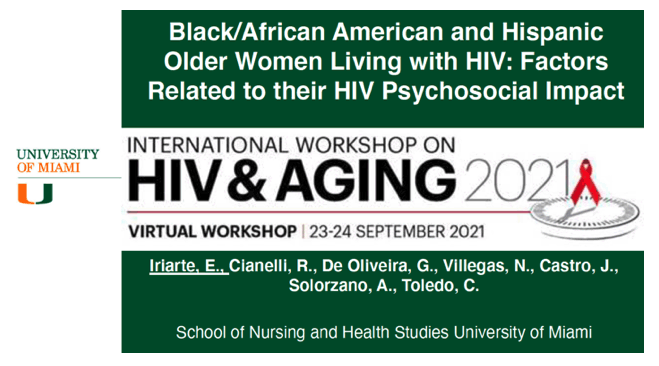
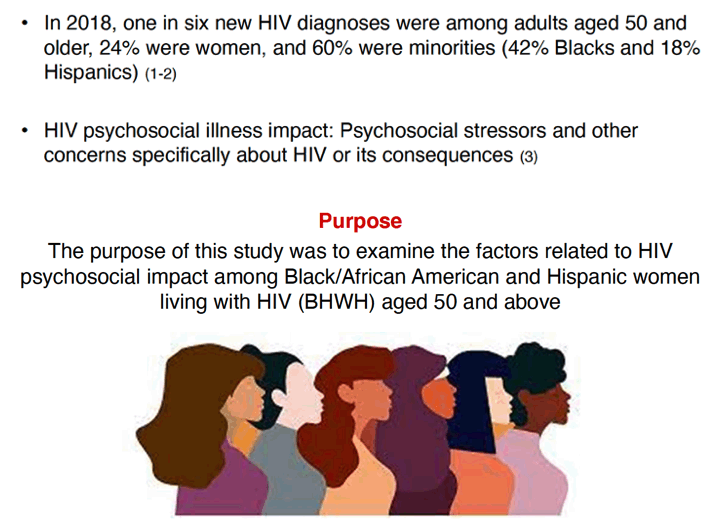
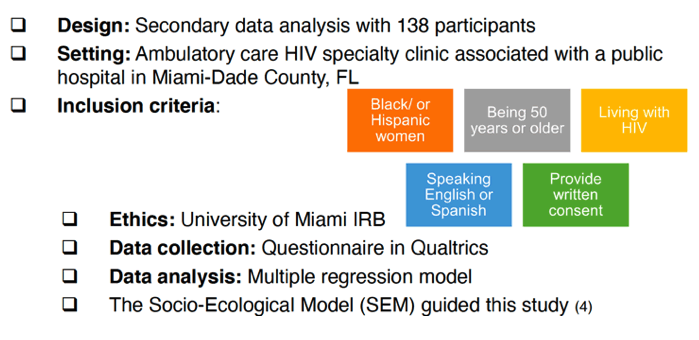
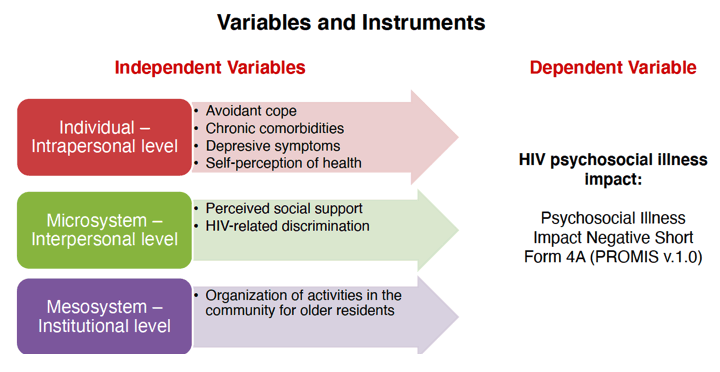
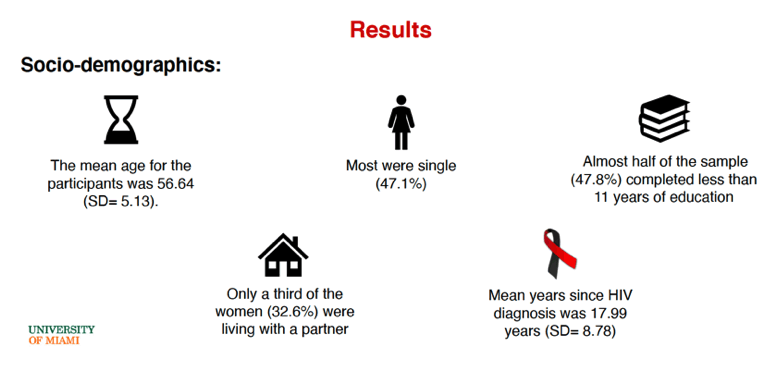
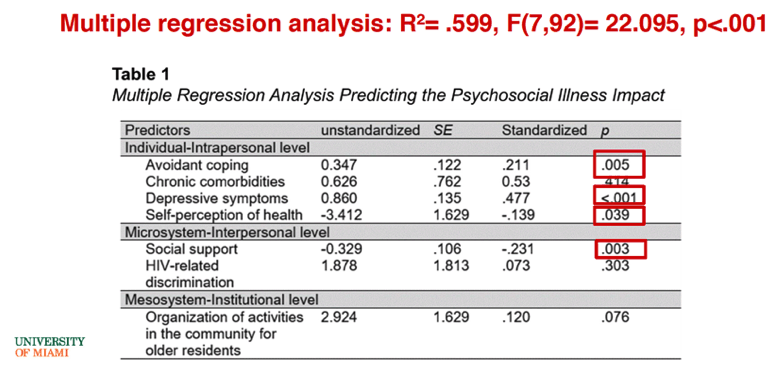
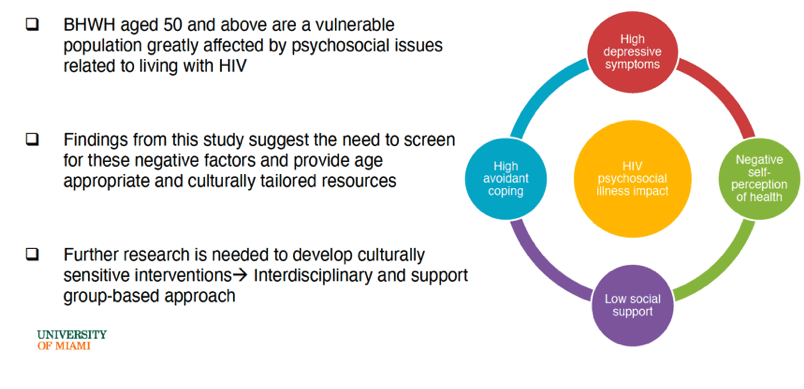
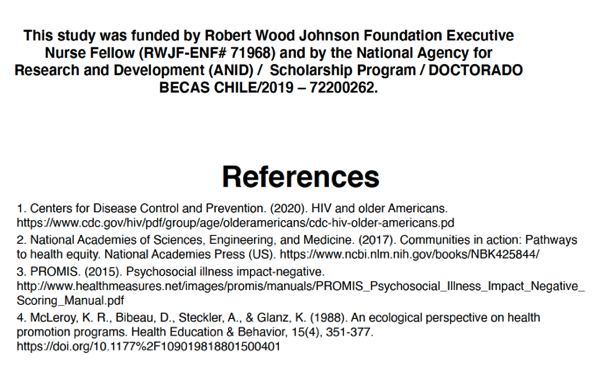
|
| |
|
 |
 |
|
|